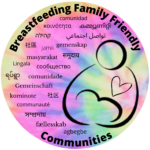What is the International Code of Marketing of Breast-milk Substitutes?
The International Code of Marketing of Breast-milk Substitutes (the Code) is a global health plan of action developed to support “safe and adequate nutrition for infants by the protection and promotion of breast-feeding, and by ensuring the proper use of breastmilk substitutes, when these are necessary, on the basis of adequate information and through appropriate marketing and distribution.” (From Aim 1 of the Code).
What products are covered in the Code?
- Infant formula
- Feeding Bottles
- Nipples/teats
- Foods and beverages targeted for babies under 6 months of age
- Follow up formulas and growing up milks targeted for toddlers
What does the Code mean for BUSINESSES?
You may be wondering if you can sell formula and still be compliant with the Code? Yes, you can sell formula and the other products covered by the Code. What can your business do?
- Sell formula and other products covered by the Code? YES
- Ensure that all labels include accurate and clear instructions on proper and safe formula preparation? YES
- Advertise any of the products covered by the Code? NO!
- Provide coupons for or free samples of any products covered by the Code? NO!
- Offer promotions or discounts on any covered products or give “any gifts of articles or utensils which may promote the use of breast-milk substitutes or bottle-feeding?” NO!
- Display products in a preferential location in the store (e.g., formula or bottles sold on the “end caps”)? NO!
What does the Code mean for healthcare providers and facilities, and for health departments? How does the Code impact your healthcare practice. What can healthcare workers and facilities do?
- Protect and promote breastfeeding? YES!
- Provide information and education on the benefits of breastfeeding? YES
- Avoid conflicts of interest by not accepting any materials or financial inducements from manufacturers and distributors of breastmilk substitutes or any products covered by the Code? YES
- Promote or display products covered by the Code, which includes the products and signs, placards, and posters concerning the products? NO!
- Distribute materials provided by a manufacturer or distributor of products covered by the Code? NO!
- Accept any free or low-cost supplies from manufacturers or distributors of covered products? NO!
- Use personnel in your facilities who are paid for by manufacturers or distributors? NO!
What does the Code mean for parents?
- The Code does NOT say that families can’t choose to use formula.
- The Code works to support families to be able to meet their own breastfeeding goals by protecting parents from aggressive and inappropriate marketing of breastmilk substitutes.
- The Code requires that parents receive objective, accurate and consistent information about the importance of breastfeeding, and that is not influenced by manufacturers/distributors of breastmilk substitutes, to allow parents to make informed decisions about infant feeding.
Why is the Code needed?
By the 1970’s, breastfeeding was declining dramatically in many parts of the world. One important reason for the decline was the aggressive promotion of breastmilk substitutes by manufacturers and distributors to workers in healthcare facilities and directly to parents. The Code was adopted in 1981 by the World Health Assembly (WHA), the decision-making body of the World Health Organization (WHO), and has been updated by the WHA through resolutions to strengthen, clarify, and provide guidance, especially as new products are developed and new marketing tactics are used. Together, the Code and its subsequent resolutions aim to protect breastfeeding from commercial influences, prevent aggressive marketing and distribution of breastmilk substitutes, and ensure the appropriate marketing and distribution of breastmilk substitutes when they are needed.
What is the current status of the Code?
Digital marketing has become a dominant form of marketing. Unlike traditional marketing, digital marketing can be highly targeted and is very effective. It includes a broader set of actors (e.g., influencers) and can stay below the radar of regulators (i.e., not always recognized as advertising). At the request of the World Health Assembly, the WHO developed guidance on regulatory measures to restrict digital marketing of breast-milk substitutes. The Guidance on regulatory measures aimed at restricting digital marketing of breast-milk substitutes contains 11 recommendations for Member State actions.
…Applying the Code to digital environments requires the development of specific implementation mechanism, coordination across a broader set of government bodies, and the establishment of specific legal duties on the range of entities involved in the digital marketing value chain…The recommendations highlight new marketing tactics that were not possible without digital technologies and describe legislative solutions to addressing them.
WHO Guidance on regulatory measures aimed at restricting digital marketing of breast-milk substitutes
Learn More
77th World Health Assembly Side Event on Digital Marketing of Breastmilk Substitutes | New evidence on the rise of aggressive digital marketing of breastmilk substitutes: https://www.globalbreastfeedingcollective.org/77th-world-health-assembly-side-event-digital-marketing-breastmilk-substitutes Organized by the International Baby Food Action Network (IBFAN), Save the Children, UNICEF, International Lactation Consultant Association (ILCA), and the World Obesity Federation, and co-sponsored by Bangladesh, Brazil, Lesotho, and Mexico.
Countries failing to stop harmful marketing of breast-milk substitutes, warn WHO and UNICEF Press Release (https://www.who.int/news-room/detail/27-05-2020-countries-failing-to-stop-harmful-marketing-of-breast-milk-substitutes-warn-who-and-unicef)
Guidance on regulatory measures aimed at restricting digital marketing of breast-milk substitutes: https://iris.who.int/handle/10665/374182
Marketing of breast-milk substitutes: national implementation of the international code, status report 2024: https://www.who.int/publications/i/item/9789240094482
Marketing of breast-milk substitutes: national implementation of the international code, status report 2022: https://apps.who.int/iris/handle/10665/354221
Marketing of breast-milk substitutes: national implementation of the international code, status report 2020: https://www.who.int/publications/i/item/9789240006010
Scope and impact of digital marketing strategies for promoting breastmilk substitutes: https://www.who.int/publications/i/item/9789240046085
The International Code of Marketing of Breast-Milk Substitutes: https://www.who.int/publications/i/item/9241541601
The International Code of Marketing of Breast-Milk Substitutes: Frequently Asked Questions 2017 Updates: https://www.who.int/publications/i/item/WHO-NMH-NHD-17.1
Page updated: 04/25/2025
